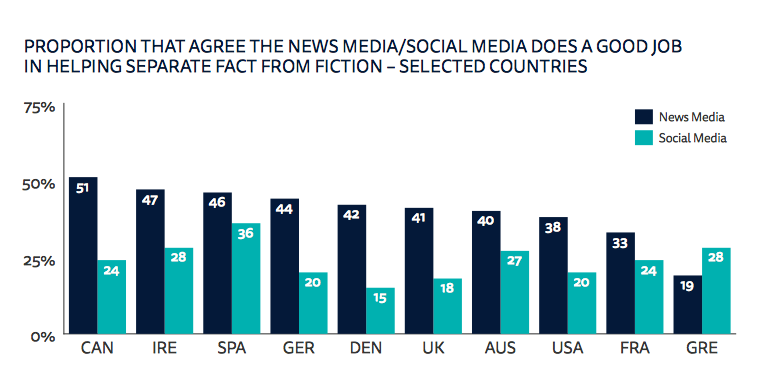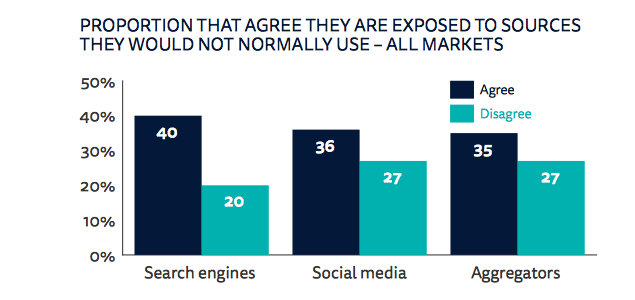Social media trusted twice less than news media, shows the 2017 Digital News Report

The year 2016-2017 has seen intense debates over fake news, algorithms and distrust towards journalists and journalism. The 2017 Digital News Report, published by the Reuters Institute for the study of journalism, contains interesting findings on some of the prevailing narratives around these issues.
- Social media are not doing a good job in separating fact from fiction
The overall trust in news – 43% all media combined – drops significantly when it comes to social media, as only 24% thinks that social media do a good job in separating fact from fiction, compared to 40% for the news media. Only in Greece, more people trust social media (28% compared to 19% for news media).
- Trust goes together with political polarisation
In many countries, the study shows a strong connection between distrust in the media and perceived political bias. This is particularly true in countries with high levels of political polarisation such as Greece, Italy, or Hungary. The report shows a similar pattern to last year, with trust highest in Northern European and Scandinavian countries. Again, Central, Southern and Eastern European countries tend to be at the other end of the scale.
- Algorithms result in more diversity
The study also shows that more people are discovering news through algorithms than editors. More than half (54%) prefer the selection of stories through algorithms rather than editors or journalists (44%). However, new evidence show that far from restricting content, algorithms are exposing most users to a greater range of online sources.
The 2016 Digital News Report also gives an overview of new users’ practices to access the news and the challenges to be met by publishers.
- More people might be ready to pay for news in the future
In general, there is still a reluctance to pay for online news. However, the report provides some encouragement “that more might be prepared to pay in the future if content is sufficiently valuable, convenient and relevant”. The Nordic region is already doing well when it comes to digital subscriptions. Norway (15% with ongoing digital subscription), Sweden (12%) and Denmark (10%) rank first, well ahead of Greece, Czech Republic (2%), the UK, Germany, Croatia, France (3%). It has to be related to the strong reading tradition alongside a culture of print subscription which has been transferred to digital. The reasons cited for why non-payers remain reluctant to pay for digital news are:
- For 54%, the widespread availability of free content
- For 29%, because the “favorite brand” doesn’t currently charge
- A much smaller proportion say news is not worth paying for
- The rise of messaging app for news
More and more people are using messaging applications to find, share or discuss news. The use of WhatsApp has jumped significantly in the last year to 15%. Spain is the first European country using it with 32% (+8%). However, Facebook remains leader in a number of countries including Greece (17%), Portugal (16%), Romania (15%), Norway and Poland (10%). The growth of messaging should be seen as an extra layer on top of social networking rather than a replacement.
- The different gateways to news
The study looked at preferred ways of getting to content. The results show that destination websites and apps remain slightly ahead of search and social media. However, when taking all gateways together (search, social media, email, mobiles alerts, aggregators), a clear majority (65%) prefer to use a side-door to access news – rising to 73% for people under 35.
Some interesting regional particularities are highlighted: People in Scandinavia and the UK are more likely to go directly to a website or an app. By contrast, social media are hugely popular starting point in some Central and Eastern European countries. In Belgium, 34% access news via email.
- The value of news brands
The study shows new evidence that news brands may be struggling to cut through on distributed platforms. Two-thirds of the respondents remembered the path through which they found the news story (Facebook, Google) but less than half could recall the name of the news brand itself when coming from search (37%) and social media (47%).
Read here the 2016 report.
The survey was conducted by YouGov using an online questionnaire at the end of January/beginning of February 2017 in 36 countries including the US and UK. A sample of 70.000 were surveyed.












